Taxation Report: Analysis of UK Tax Laws for Mr. Desai's Business
VerifiedAdded on 2021/09/23
|6
|2409
|298
Report
AI Summary
This report provides a comprehensive analysis of UK tax law, addressing various aspects relevant to Mr. Desai's business activities. It begins by examining whether Mr. Desai's vocation of collecting and restoring antiques constitutes trading under HMRC regulations, considering the characteristics of trade and relevant case laws. The report then differentiates between tax evasion and tax avoidance, outlining the remedial steps HMRC can take to counteract tax avoidance. The analysis further delves into the allowability of various expenditures when computing trading profit, including expenses related to obtaining finance, repairs, fines, depreciation, legal fees, insurance compensation, and interest from suppliers. Additionally, the report covers VAT registration requirements, including the threshold for compulsory registration, the process for filing VAT returns electronically, and the benefits of the Flat Rate Scheme. Finally, it addresses the actions required when a customer defaults on payment. The report uses relevant UK tax laws, case studies, and HMRC guidelines to provide insights and recommendations for Mr. Desai.
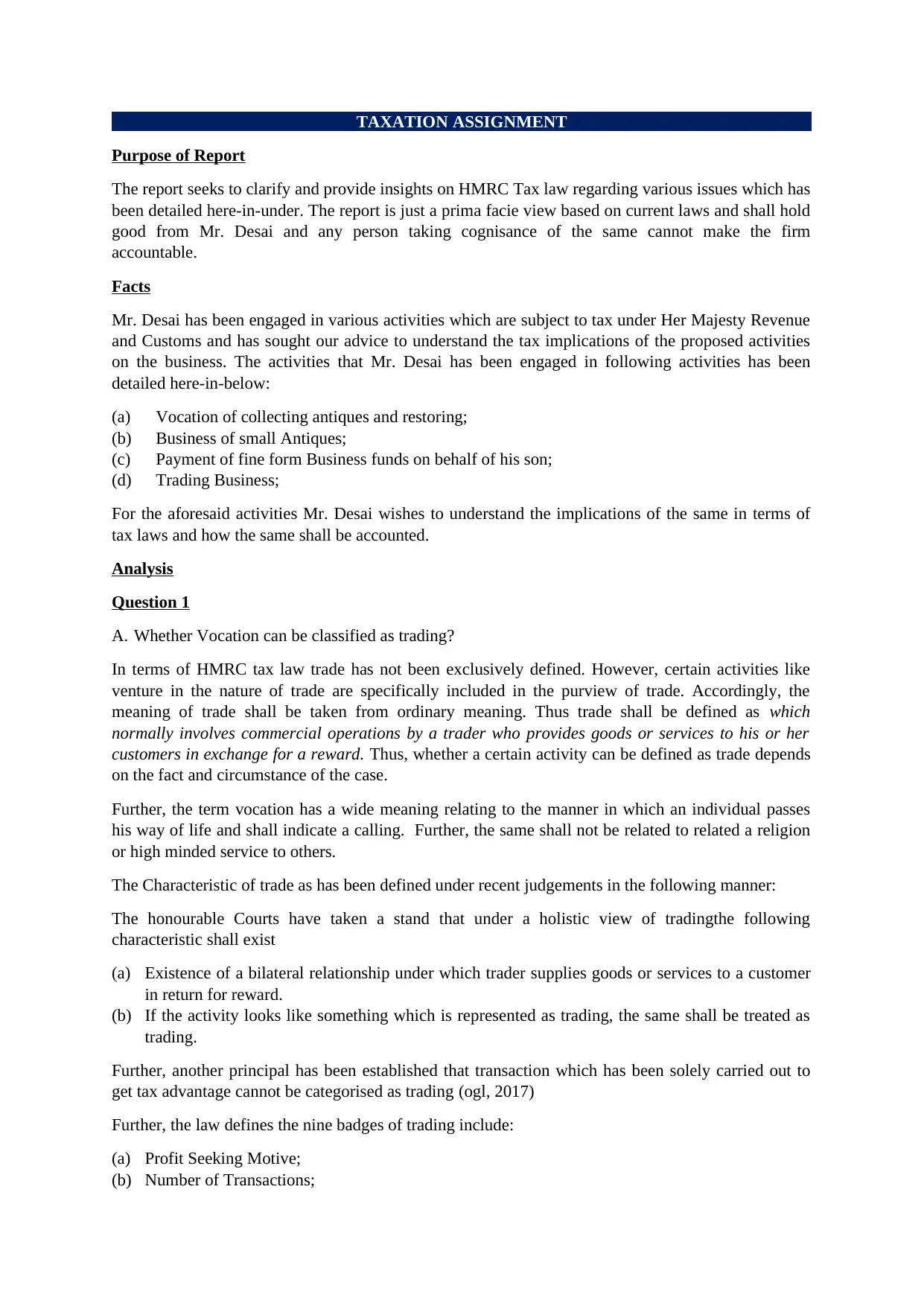
TAXATION ASSIGNMENT
Purpose of Report
The report seeks to clarify and provide insights on HMRC Tax law regarding various issues which has
been detailed here-in-under. The report is just a prima facie view based on current laws and shall hold
good from Mr. Desai and any person taking cognisance of the same cannot make the firm
accountable.
Facts
Mr. Desai has been engaged in various activities which are subject to tax under Her Majesty Revenue
and Customs and has sought our advice to understand the tax implications of the proposed activities
on the business. The activities that Mr. Desai has been engaged in following activities has been
detailed here-in-below:
(a) Vocation of collecting antiques and restoring;
(b) Business of small Antiques;
(c) Payment of fine form Business funds on behalf of his son;
(d) Trading Business;
For the aforesaid activities Mr. Desai wishes to understand the implications of the same in terms of
tax laws and how the same shall be accounted.
Analysis
Question 1
A. Whether Vocation can be classified as trading?
In terms of HMRC tax law trade has not been exclusively defined. However, certain activities like
venture in the nature of trade are specifically included in the purview of trade. Accordingly, the
meaning of trade shall be taken from ordinary meaning. Thus trade shall be defined as which
normally involves commercial operations by a trader who provides goods or services to his or her
customers in exchange for a reward. Thus, whether a certain activity can be defined as trade depends
on the fact and circumstance of the case.
Further, the term vocation has a wide meaning relating to the manner in which an individual passes
his way of life and shall indicate a calling. Further, the same shall not be related to related a religion
or high minded service to others.
The Characteristic of trade as has been defined under recent judgements in the following manner:
The honourable Courts have taken a stand that under a holistic view of tradingthe following
characteristic shall exist
(a) Existence of a bilateral relationship under which trader supplies goods or services to a customer
in return for reward.
(b) If the activity looks like something which is represented as trading, the same shall be treated as
trading.
Further, another principal has been established that transaction which has been solely carried out to
get tax advantage cannot be categorised as trading (ogl, 2017)
Further, the law defines the nine badges of trading include:
(a) Profit Seeking Motive;
(b) Number of Transactions;
Purpose of Report
The report seeks to clarify and provide insights on HMRC Tax law regarding various issues which has
been detailed here-in-under. The report is just a prima facie view based on current laws and shall hold
good from Mr. Desai and any person taking cognisance of the same cannot make the firm
accountable.
Facts
Mr. Desai has been engaged in various activities which are subject to tax under Her Majesty Revenue
and Customs and has sought our advice to understand the tax implications of the proposed activities
on the business. The activities that Mr. Desai has been engaged in following activities has been
detailed here-in-below:
(a) Vocation of collecting antiques and restoring;
(b) Business of small Antiques;
(c) Payment of fine form Business funds on behalf of his son;
(d) Trading Business;
For the aforesaid activities Mr. Desai wishes to understand the implications of the same in terms of
tax laws and how the same shall be accounted.
Analysis
Question 1
A. Whether Vocation can be classified as trading?
In terms of HMRC tax law trade has not been exclusively defined. However, certain activities like
venture in the nature of trade are specifically included in the purview of trade. Accordingly, the
meaning of trade shall be taken from ordinary meaning. Thus trade shall be defined as which
normally involves commercial operations by a trader who provides goods or services to his or her
customers in exchange for a reward. Thus, whether a certain activity can be defined as trade depends
on the fact and circumstance of the case.
Further, the term vocation has a wide meaning relating to the manner in which an individual passes
his way of life and shall indicate a calling. Further, the same shall not be related to related a religion
or high minded service to others.
The Characteristic of trade as has been defined under recent judgements in the following manner:
The honourable Courts have taken a stand that under a holistic view of tradingthe following
characteristic shall exist
(a) Existence of a bilateral relationship under which trader supplies goods or services to a customer
in return for reward.
(b) If the activity looks like something which is represented as trading, the same shall be treated as
trading.
Further, another principal has been established that transaction which has been solely carried out to
get tax advantage cannot be categorised as trading (ogl, 2017)
Further, the law defines the nine badges of trading include:
(a) Profit Seeking Motive;
(b) Number of Transactions;
Paraphrase This Document
Need a fresh take? Get an instant paraphrase of this document with our AI Paraphraser
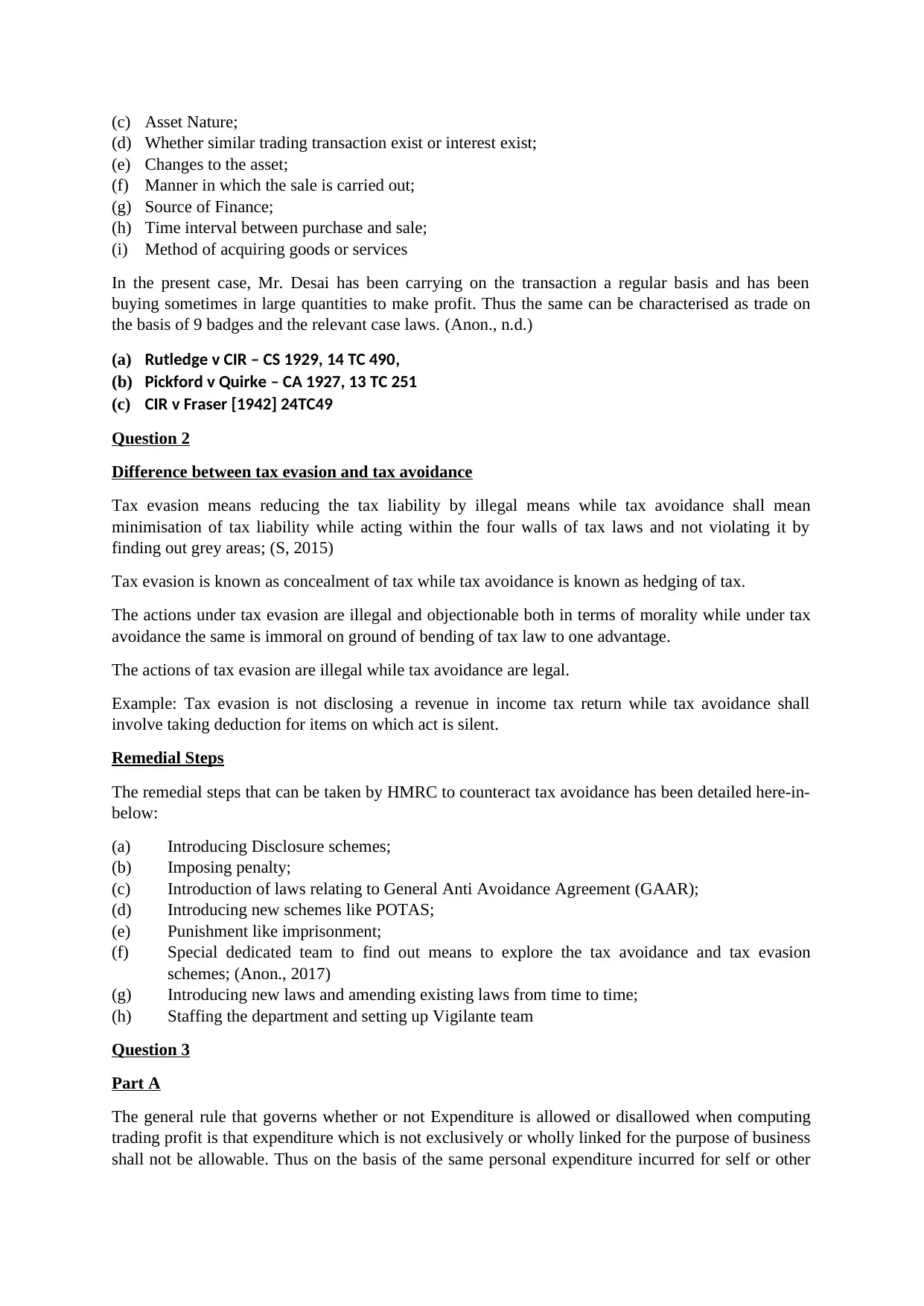
(c) Asset Nature;
(d) Whether similar trading transaction exist or interest exist;
(e) Changes to the asset;
(f) Manner in which the sale is carried out;
(g) Source of Finance;
(h) Time interval between purchase and sale;
(i) Method of acquiring goods or services
In the present case, Mr. Desai has been carrying on the transaction a regular basis and has been
buying sometimes in large quantities to make profit. Thus the same can be characterised as trade on
the basis of 9 badges and the relevant case laws. (Anon., n.d.)
(a) Rutledge v CIR – CS 1929, 14 TC 490,
(b) Pickford v Quirke – CA 1927, 13 TC 251
(c) CIR v Fraser [1942] 24TC49
Question 2
Difference between tax evasion and tax avoidance
Tax evasion means reducing the tax liability by illegal means while tax avoidance shall mean
minimisation of tax liability while acting within the four walls of tax laws and not violating it by
finding out grey areas; (S, 2015)
Tax evasion is known as concealment of tax while tax avoidance is known as hedging of tax.
The actions under tax evasion are illegal and objectionable both in terms of morality while under tax
avoidance the same is immoral on ground of bending of tax law to one advantage.
The actions of tax evasion are illegal while tax avoidance are legal.
Example: Tax evasion is not disclosing a revenue in income tax return while tax avoidance shall
involve taking deduction for items on which act is silent.
Remedial Steps
The remedial steps that can be taken by HMRC to counteract tax avoidance has been detailed here-in-
below:
(a) Introducing Disclosure schemes;
(b) Imposing penalty;
(c) Introduction of laws relating to General Anti Avoidance Agreement (GAAR);
(d) Introducing new schemes like POTAS;
(e) Punishment like imprisonment;
(f) Special dedicated team to find out means to explore the tax avoidance and tax evasion
schemes; (Anon., 2017)
(g) Introducing new laws and amending existing laws from time to time;
(h) Staffing the department and setting up Vigilante team
Question 3
Part A
The general rule that governs whether or not Expenditure is allowed or disallowed when computing
trading profit is that expenditure which is not exclusively or wholly linked for the purpose of business
shall not be allowable. Thus on the basis of the same personal expenditure incurred for self or other
(d) Whether similar trading transaction exist or interest exist;
(e) Changes to the asset;
(f) Manner in which the sale is carried out;
(g) Source of Finance;
(h) Time interval between purchase and sale;
(i) Method of acquiring goods or services
In the present case, Mr. Desai has been carrying on the transaction a regular basis and has been
buying sometimes in large quantities to make profit. Thus the same can be characterised as trade on
the basis of 9 badges and the relevant case laws. (Anon., n.d.)
(a) Rutledge v CIR – CS 1929, 14 TC 490,
(b) Pickford v Quirke – CA 1927, 13 TC 251
(c) CIR v Fraser [1942] 24TC49
Question 2
Difference between tax evasion and tax avoidance
Tax evasion means reducing the tax liability by illegal means while tax avoidance shall mean
minimisation of tax liability while acting within the four walls of tax laws and not violating it by
finding out grey areas; (S, 2015)
Tax evasion is known as concealment of tax while tax avoidance is known as hedging of tax.
The actions under tax evasion are illegal and objectionable both in terms of morality while under tax
avoidance the same is immoral on ground of bending of tax law to one advantage.
The actions of tax evasion are illegal while tax avoidance are legal.
Example: Tax evasion is not disclosing a revenue in income tax return while tax avoidance shall
involve taking deduction for items on which act is silent.
Remedial Steps
The remedial steps that can be taken by HMRC to counteract tax avoidance has been detailed here-in-
below:
(a) Introducing Disclosure schemes;
(b) Imposing penalty;
(c) Introduction of laws relating to General Anti Avoidance Agreement (GAAR);
(d) Introducing new schemes like POTAS;
(e) Punishment like imprisonment;
(f) Special dedicated team to find out means to explore the tax avoidance and tax evasion
schemes; (Anon., 2017)
(g) Introducing new laws and amending existing laws from time to time;
(h) Staffing the department and setting up Vigilante team
Question 3
Part A
The general rule that governs whether or not Expenditure is allowed or disallowed when computing
trading profit is that expenditure which is not exclusively or wholly linked for the purpose of business
shall not be allowable. Thus on the basis of the same personal expenditure incurred for self or other
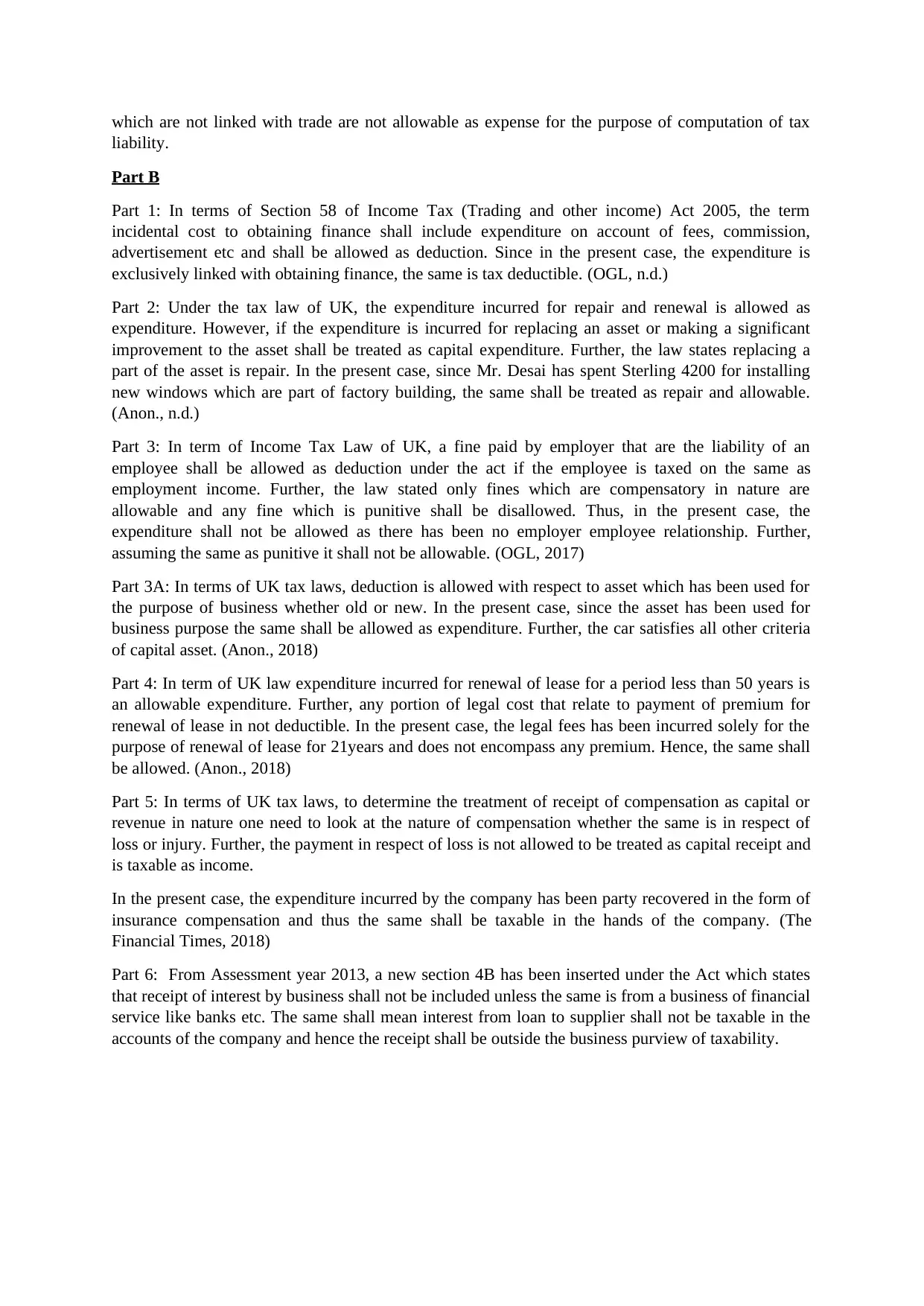
which are not linked with trade are not allowable as expense for the purpose of computation of tax
liability.
Part B
Part 1: In terms of Section 58 of Income Tax (Trading and other income) Act 2005, the term
incidental cost to obtaining finance shall include expenditure on account of fees, commission,
advertisement etc and shall be allowed as deduction. Since in the present case, the expenditure is
exclusively linked with obtaining finance, the same is tax deductible. (OGL, n.d.)
Part 2: Under the tax law of UK, the expenditure incurred for repair and renewal is allowed as
expenditure. However, if the expenditure is incurred for replacing an asset or making a significant
improvement to the asset shall be treated as capital expenditure. Further, the law states replacing a
part of the asset is repair. In the present case, since Mr. Desai has spent Sterling 4200 for installing
new windows which are part of factory building, the same shall be treated as repair and allowable.
(Anon., n.d.)
Part 3: In term of Income Tax Law of UK, a fine paid by employer that are the liability of an
employee shall be allowed as deduction under the act if the employee is taxed on the same as
employment income. Further, the law stated only fines which are compensatory in nature are
allowable and any fine which is punitive shall be disallowed. Thus, in the present case, the
expenditure shall not be allowed as there has been no employer employee relationship. Further,
assuming the same as punitive it shall not be allowable. (OGL, 2017)
Part 3A: In terms of UK tax laws, deduction is allowed with respect to asset which has been used for
the purpose of business whether old or new. In the present case, since the asset has been used for
business purpose the same shall be allowed as expenditure. Further, the car satisfies all other criteria
of capital asset. (Anon., 2018)
Part 4: In term of UK law expenditure incurred for renewal of lease for a period less than 50 years is
an allowable expenditure. Further, any portion of legal cost that relate to payment of premium for
renewal of lease in not deductible. In the present case, the legal fees has been incurred solely for the
purpose of renewal of lease for 21years and does not encompass any premium. Hence, the same shall
be allowed. (Anon., 2018)
Part 5: In terms of UK tax laws, to determine the treatment of receipt of compensation as capital or
revenue in nature one need to look at the nature of compensation whether the same is in respect of
loss or injury. Further, the payment in respect of loss is not allowed to be treated as capital receipt and
is taxable as income.
In the present case, the expenditure incurred by the company has been party recovered in the form of
insurance compensation and thus the same shall be taxable in the hands of the company. (The
Financial Times, 2018)
Part 6: From Assessment year 2013, a new section 4B has been inserted under the Act which states
that receipt of interest by business shall not be included unless the same is from a business of financial
service like banks etc. The same shall mean interest from loan to supplier shall not be taxable in the
accounts of the company and hence the receipt shall be outside the business purview of taxability.
liability.
Part B
Part 1: In terms of Section 58 of Income Tax (Trading and other income) Act 2005, the term
incidental cost to obtaining finance shall include expenditure on account of fees, commission,
advertisement etc and shall be allowed as deduction. Since in the present case, the expenditure is
exclusively linked with obtaining finance, the same is tax deductible. (OGL, n.d.)
Part 2: Under the tax law of UK, the expenditure incurred for repair and renewal is allowed as
expenditure. However, if the expenditure is incurred for replacing an asset or making a significant
improvement to the asset shall be treated as capital expenditure. Further, the law states replacing a
part of the asset is repair. In the present case, since Mr. Desai has spent Sterling 4200 for installing
new windows which are part of factory building, the same shall be treated as repair and allowable.
(Anon., n.d.)
Part 3: In term of Income Tax Law of UK, a fine paid by employer that are the liability of an
employee shall be allowed as deduction under the act if the employee is taxed on the same as
employment income. Further, the law stated only fines which are compensatory in nature are
allowable and any fine which is punitive shall be disallowed. Thus, in the present case, the
expenditure shall not be allowed as there has been no employer employee relationship. Further,
assuming the same as punitive it shall not be allowable. (OGL, 2017)
Part 3A: In terms of UK tax laws, deduction is allowed with respect to asset which has been used for
the purpose of business whether old or new. In the present case, since the asset has been used for
business purpose the same shall be allowed as expenditure. Further, the car satisfies all other criteria
of capital asset. (Anon., 2018)
Part 4: In term of UK law expenditure incurred for renewal of lease for a period less than 50 years is
an allowable expenditure. Further, any portion of legal cost that relate to payment of premium for
renewal of lease in not deductible. In the present case, the legal fees has been incurred solely for the
purpose of renewal of lease for 21years and does not encompass any premium. Hence, the same shall
be allowed. (Anon., 2018)
Part 5: In terms of UK tax laws, to determine the treatment of receipt of compensation as capital or
revenue in nature one need to look at the nature of compensation whether the same is in respect of
loss or injury. Further, the payment in respect of loss is not allowed to be treated as capital receipt and
is taxable as income.
In the present case, the expenditure incurred by the company has been party recovered in the form of
insurance compensation and thus the same shall be taxable in the hands of the company. (The
Financial Times, 2018)
Part 6: From Assessment year 2013, a new section 4B has been inserted under the Act which states
that receipt of interest by business shall not be included unless the same is from a business of financial
service like banks etc. The same shall mean interest from loan to supplier shall not be taxable in the
accounts of the company and hence the receipt shall be outside the business purview of taxability.
⊘ This is a preview!⊘
Do you want full access?
Subscribe today to unlock all pages.

Trusted by 1+ million students worldwide
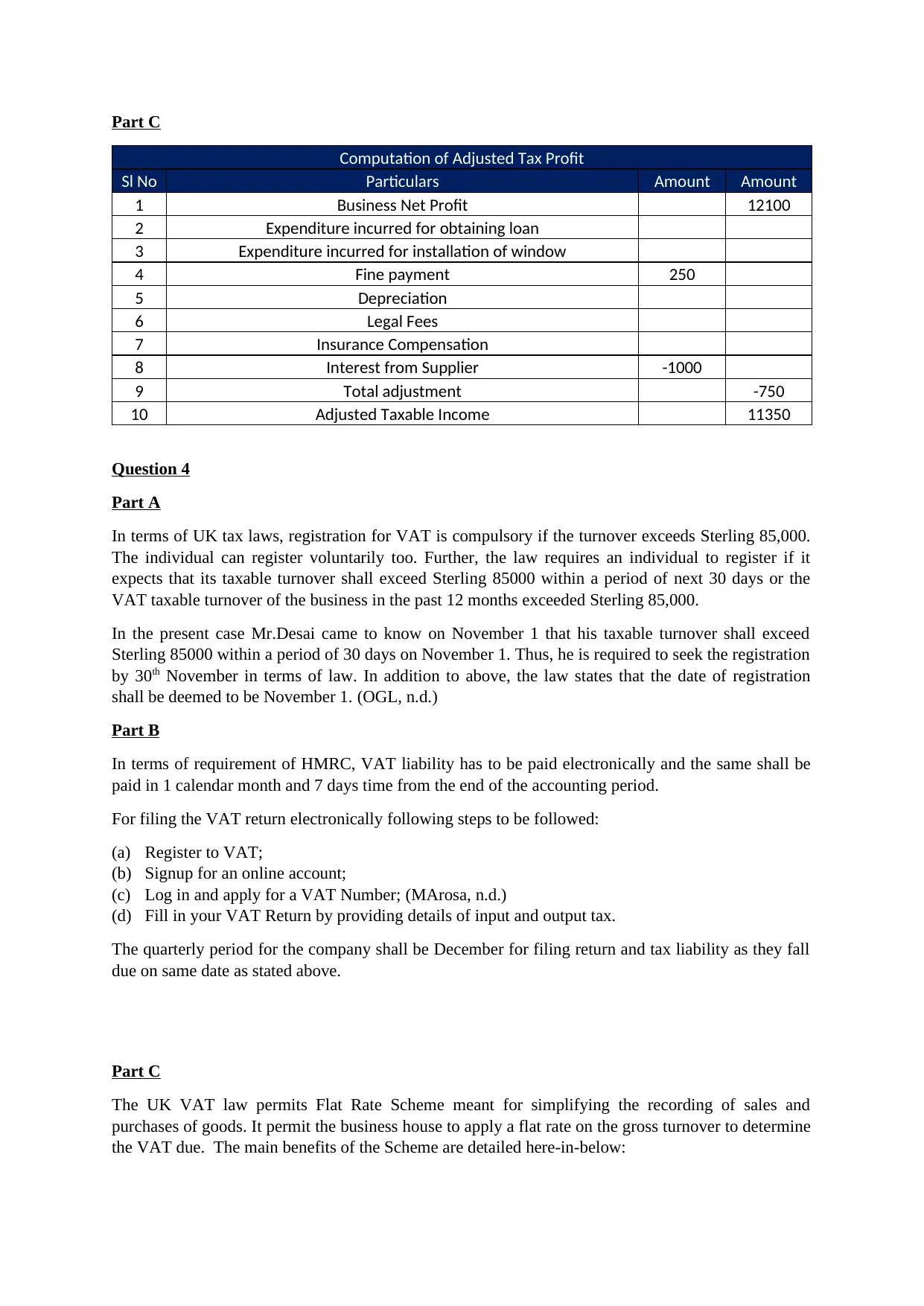
Part C
Computation of Adjusted Tax Profit
Sl No Particulars Amount Amount
1 Business Net Profit 12100
2 Expenditure incurred for obtaining loan
3 Expenditure incurred for installation of window
4 Fine payment 250
5 Depreciation
6 Legal Fees
7 Insurance Compensation
8 Interest from Supplier -1000
9 Total adjustment -750
10 Adjusted Taxable Income 11350
Question 4
Part A
In terms of UK tax laws, registration for VAT is compulsory if the turnover exceeds Sterling 85,000.
The individual can register voluntarily too. Further, the law requires an individual to register if it
expects that its taxable turnover shall exceed Sterling 85000 within a period of next 30 days or the
VAT taxable turnover of the business in the past 12 months exceeded Sterling 85,000.
In the present case Mr.Desai came to know on November 1 that his taxable turnover shall exceed
Sterling 85000 within a period of 30 days on November 1. Thus, he is required to seek the registration
by 30th November in terms of law. In addition to above, the law states that the date of registration
shall be deemed to be November 1. (OGL, n.d.)
Part B
In terms of requirement of HMRC, VAT liability has to be paid electronically and the same shall be
paid in 1 calendar month and 7 days time from the end of the accounting period.
For filing the VAT return electronically following steps to be followed:
(a) Register to VAT;
(b) Signup for an online account;
(c) Log in and apply for a VAT Number; (MArosa, n.d.)
(d) Fill in your VAT Return by providing details of input and output tax.
The quarterly period for the company shall be December for filing return and tax liability as they fall
due on same date as stated above.
Part C
The UK VAT law permits Flat Rate Scheme meant for simplifying the recording of sales and
purchases of goods. It permit the business house to apply a flat rate on the gross turnover to determine
the VAT due. The main benefits of the Scheme are detailed here-in-below:
Computation of Adjusted Tax Profit
Sl No Particulars Amount Amount
1 Business Net Profit 12100
2 Expenditure incurred for obtaining loan
3 Expenditure incurred for installation of window
4 Fine payment 250
5 Depreciation
6 Legal Fees
7 Insurance Compensation
8 Interest from Supplier -1000
9 Total adjustment -750
10 Adjusted Taxable Income 11350
Question 4
Part A
In terms of UK tax laws, registration for VAT is compulsory if the turnover exceeds Sterling 85,000.
The individual can register voluntarily too. Further, the law requires an individual to register if it
expects that its taxable turnover shall exceed Sterling 85000 within a period of next 30 days or the
VAT taxable turnover of the business in the past 12 months exceeded Sterling 85,000.
In the present case Mr.Desai came to know on November 1 that his taxable turnover shall exceed
Sterling 85000 within a period of 30 days on November 1. Thus, he is required to seek the registration
by 30th November in terms of law. In addition to above, the law states that the date of registration
shall be deemed to be November 1. (OGL, n.d.)
Part B
In terms of requirement of HMRC, VAT liability has to be paid electronically and the same shall be
paid in 1 calendar month and 7 days time from the end of the accounting period.
For filing the VAT return electronically following steps to be followed:
(a) Register to VAT;
(b) Signup for an online account;
(c) Log in and apply for a VAT Number; (MArosa, n.d.)
(d) Fill in your VAT Return by providing details of input and output tax.
The quarterly period for the company shall be December for filing return and tax liability as they fall
due on same date as stated above.
Part C
The UK VAT law permits Flat Rate Scheme meant for simplifying the recording of sales and
purchases of goods. It permit the business house to apply a flat rate on the gross turnover to determine
the VAT due. The main benefits of the Scheme are detailed here-in-below:
Paraphrase This Document
Need a fresh take? Get an instant paraphrase of this document with our AI Paraphraser
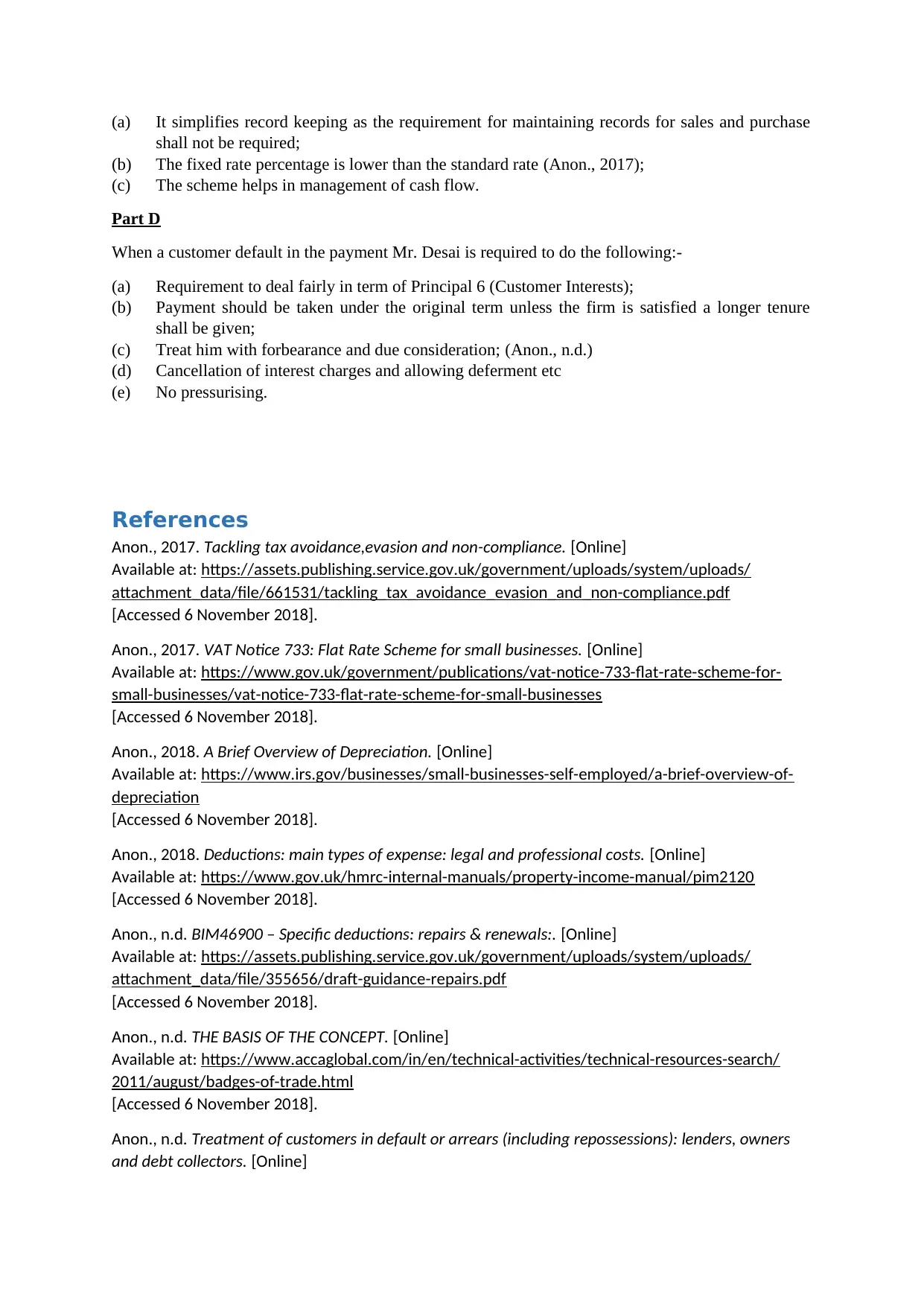
(a) It simplifies record keeping as the requirement for maintaining records for sales and purchase
shall not be required;
(b) The fixed rate percentage is lower than the standard rate (Anon., 2017);
(c) The scheme helps in management of cash flow.
Part D
When a customer default in the payment Mr. Desai is required to do the following:-
(a) Requirement to deal fairly in term of Principal 6 (Customer Interests);
(b) Payment should be taken under the original term unless the firm is satisfied a longer tenure
shall be given;
(c) Treat him with forbearance and due consideration; (Anon., n.d.)
(d) Cancellation of interest charges and allowing deferment etc
(e) No pressurising.
References
Anon., 2017. Tackling tax avoidance,evasion and non-compliance. [Online]
Available at: https://assets.publishing.service.gov.uk/government/uploads/system/uploads/
attachment_data/file/661531/tackling_tax_avoidance_evasion_and_non-compliance.pdf
[Accessed 6 November 2018].
Anon., 2017. VAT Notice 733: Flat Rate Scheme for small businesses. [Online]
Available at: https://www.gov.uk/government/publications/vat-notice-733-flat-rate-scheme-for-
small-businesses/vat-notice-733-flat-rate-scheme-for-small-businesses
[Accessed 6 November 2018].
Anon., 2018. A Brief Overview of Depreciation. [Online]
Available at: https://www.irs.gov/businesses/small-businesses-self-employed/a-brief-overview-of-
depreciation
[Accessed 6 November 2018].
Anon., 2018. Deductions: main types of expense: legal and professional costs. [Online]
Available at: https://www.gov.uk/hmrc-internal-manuals/property-income-manual/pim2120
[Accessed 6 November 2018].
Anon., n.d. BIM46900 – Specific deductions: repairs & renewals:. [Online]
Available at: https://assets.publishing.service.gov.uk/government/uploads/system/uploads/
attachment_data/file/355656/draft-guidance-repairs.pdf
[Accessed 6 November 2018].
Anon., n.d. THE BASIS OF THE CONCEPT. [Online]
Available at: https://www.accaglobal.com/in/en/technical-activities/technical-resources-search/
2011/august/badges-of-trade.html
[Accessed 6 November 2018].
Anon., n.d. Treatment of customers in default or arrears (including repossessions): lenders, owners
and debt collectors. [Online]
shall not be required;
(b) The fixed rate percentage is lower than the standard rate (Anon., 2017);
(c) The scheme helps in management of cash flow.
Part D
When a customer default in the payment Mr. Desai is required to do the following:-
(a) Requirement to deal fairly in term of Principal 6 (Customer Interests);
(b) Payment should be taken under the original term unless the firm is satisfied a longer tenure
shall be given;
(c) Treat him with forbearance and due consideration; (Anon., n.d.)
(d) Cancellation of interest charges and allowing deferment etc
(e) No pressurising.
References
Anon., 2017. Tackling tax avoidance,evasion and non-compliance. [Online]
Available at: https://assets.publishing.service.gov.uk/government/uploads/system/uploads/
attachment_data/file/661531/tackling_tax_avoidance_evasion_and_non-compliance.pdf
[Accessed 6 November 2018].
Anon., 2017. VAT Notice 733: Flat Rate Scheme for small businesses. [Online]
Available at: https://www.gov.uk/government/publications/vat-notice-733-flat-rate-scheme-for-
small-businesses/vat-notice-733-flat-rate-scheme-for-small-businesses
[Accessed 6 November 2018].
Anon., 2018. A Brief Overview of Depreciation. [Online]
Available at: https://www.irs.gov/businesses/small-businesses-self-employed/a-brief-overview-of-
depreciation
[Accessed 6 November 2018].
Anon., 2018. Deductions: main types of expense: legal and professional costs. [Online]
Available at: https://www.gov.uk/hmrc-internal-manuals/property-income-manual/pim2120
[Accessed 6 November 2018].
Anon., n.d. BIM46900 – Specific deductions: repairs & renewals:. [Online]
Available at: https://assets.publishing.service.gov.uk/government/uploads/system/uploads/
attachment_data/file/355656/draft-guidance-repairs.pdf
[Accessed 6 November 2018].
Anon., n.d. THE BASIS OF THE CONCEPT. [Online]
Available at: https://www.accaglobal.com/in/en/technical-activities/technical-resources-search/
2011/august/badges-of-trade.html
[Accessed 6 November 2018].
Anon., n.d. Treatment of customers in default or arrears (including repossessions): lenders, owners
and debt collectors. [Online]
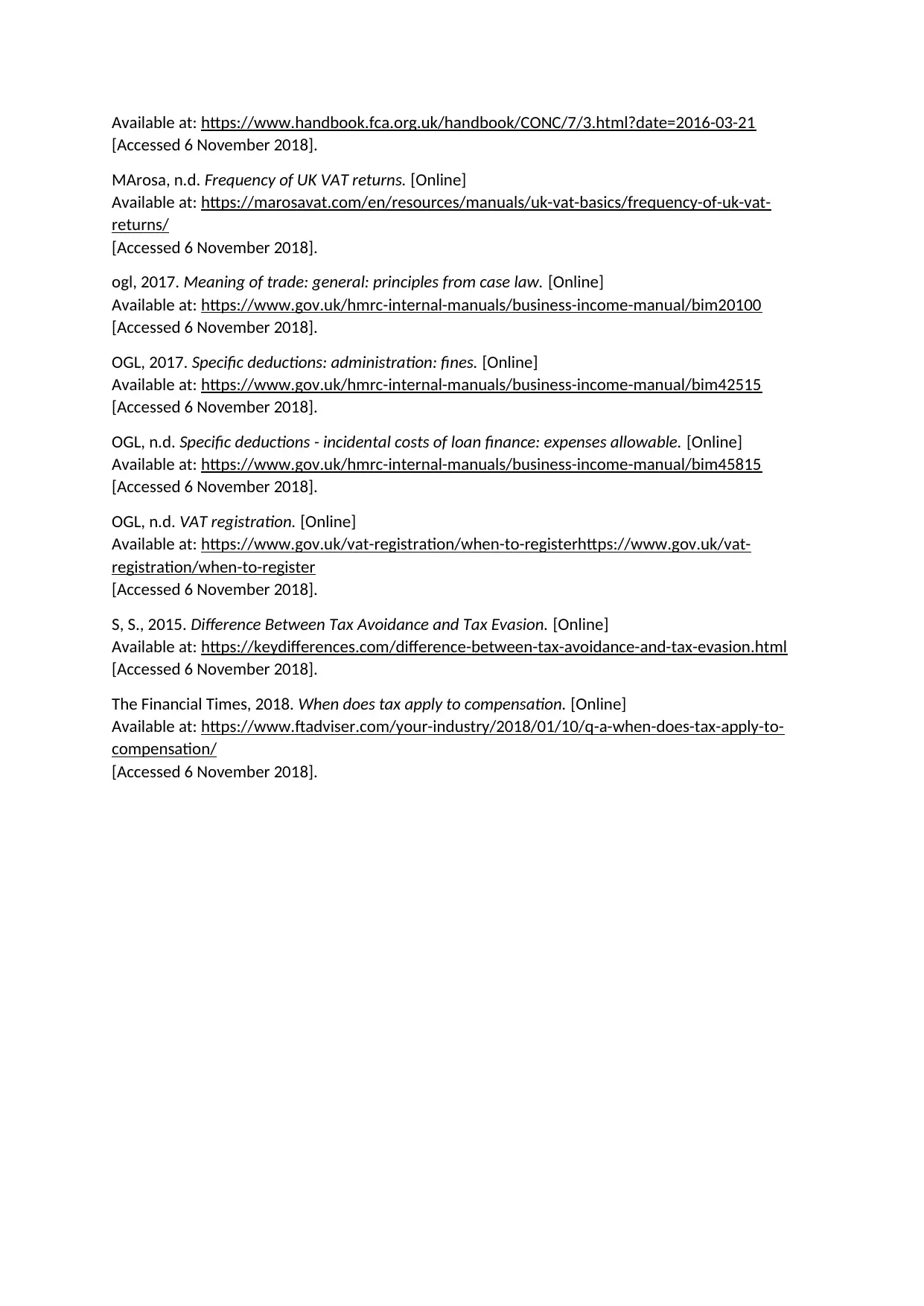
Available at: https://www.handbook.fca.org.uk/handbook/CONC/7/3.html?date=2016-03-21
[Accessed 6 November 2018].
MArosa, n.d. Frequency of UK VAT returns. [Online]
Available at: https://marosavat.com/en/resources/manuals/uk-vat-basics/frequency-of-uk-vat-
returns/
[Accessed 6 November 2018].
ogl, 2017. Meaning of trade: general: principles from case law. [Online]
Available at: https://www.gov.uk/hmrc-internal-manuals/business-income-manual/bim20100
[Accessed 6 November 2018].
OGL, 2017. Specific deductions: administration: fines. [Online]
Available at: https://www.gov.uk/hmrc-internal-manuals/business-income-manual/bim42515
[Accessed 6 November 2018].
OGL, n.d. Specific deductions - incidental costs of loan finance: expenses allowable. [Online]
Available at: https://www.gov.uk/hmrc-internal-manuals/business-income-manual/bim45815
[Accessed 6 November 2018].
OGL, n.d. VAT registration. [Online]
Available at: https://www.gov.uk/vat-registration/when-to-registerhttps://www.gov.uk/vat-
registration/when-to-register
[Accessed 6 November 2018].
S, S., 2015. Difference Between Tax Avoidance and Tax Evasion. [Online]
Available at: https://keydifferences.com/difference-between-tax-avoidance-and-tax-evasion.html
[Accessed 6 November 2018].
The Financial Times, 2018. When does tax apply to compensation. [Online]
Available at: https://www.ftadviser.com/your-industry/2018/01/10/q-a-when-does-tax-apply-to-
compensation/
[Accessed 6 November 2018].
[Accessed 6 November 2018].
MArosa, n.d. Frequency of UK VAT returns. [Online]
Available at: https://marosavat.com/en/resources/manuals/uk-vat-basics/frequency-of-uk-vat-
returns/
[Accessed 6 November 2018].
ogl, 2017. Meaning of trade: general: principles from case law. [Online]
Available at: https://www.gov.uk/hmrc-internal-manuals/business-income-manual/bim20100
[Accessed 6 November 2018].
OGL, 2017. Specific deductions: administration: fines. [Online]
Available at: https://www.gov.uk/hmrc-internal-manuals/business-income-manual/bim42515
[Accessed 6 November 2018].
OGL, n.d. Specific deductions - incidental costs of loan finance: expenses allowable. [Online]
Available at: https://www.gov.uk/hmrc-internal-manuals/business-income-manual/bim45815
[Accessed 6 November 2018].
OGL, n.d. VAT registration. [Online]
Available at: https://www.gov.uk/vat-registration/when-to-registerhttps://www.gov.uk/vat-
registration/when-to-register
[Accessed 6 November 2018].
S, S., 2015. Difference Between Tax Avoidance and Tax Evasion. [Online]
Available at: https://keydifferences.com/difference-between-tax-avoidance-and-tax-evasion.html
[Accessed 6 November 2018].
The Financial Times, 2018. When does tax apply to compensation. [Online]
Available at: https://www.ftadviser.com/your-industry/2018/01/10/q-a-when-does-tax-apply-to-
compensation/
[Accessed 6 November 2018].
⊘ This is a preview!⊘
Do you want full access?
Subscribe today to unlock all pages.

Trusted by 1+ million students worldwide
1 out of 6
Related Documents
Your All-in-One AI-Powered Toolkit for Academic Success.
+13062052269
info@desklib.com
Available 24*7 on WhatsApp / Email
![[object Object]](/_next/static/media/star-bottom.7253800d.svg)
Unlock your academic potential
Copyright © 2020–2026 A2Z Services. All Rights Reserved. Developed and managed by ZUCOL.





